To maintain perfect sleep as a caregiver, establish a consistent sleep schedule by going to bed and waking up at the same time daily. Create a calming, dark, and cool environment, limit screen time and caffeine, and incorporate relaxation techniques like deep breathing or meditation. Stay active during the day and manage stress with hobbies or support groups. If you keep these habits in mind, you’ll find it easier to enjoy restorative sleep night after night.
Key Takeaways
- Establish consistent sleep and wake times with calming routines to signal the body for restful sleep.
- Optimize the sleep environment by maintaining a cool, dark, quiet room and minimizing electronic distractions.
- Manage stress through regular exercise, relaxation techniques, and social connections to promote better sleep quality.
- Incorporate natural remedies like aromatherapy and sleep-promoting foods safely, alongside good sleep habits.
- Monitor sleep patterns and address disruptions early with a sleep diary and healthy lifestyle adjustments.
Establishing a Consistent Sleep Schedule
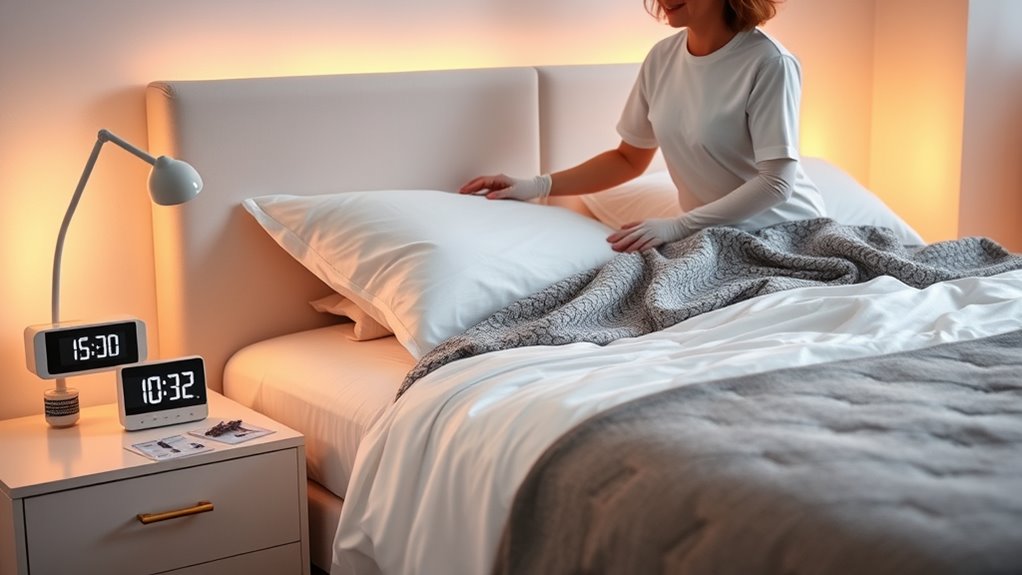
Establishing a consistent sleep schedule is essential for caregivers who often face unpredictable routines. Good sleep hygiene relies on going to bed and waking up at the same times each day, even on weekends. This regularity helps regulate your internal clock, making it easier to fall asleep and wake refreshed. Developing a calming bedtime routine signals your body that it’s time to wind down, reinforcing your sleep schedule. Avoid caffeine, screen time, and heavy meals close to bedtime, as these can disrupt your ability to fall asleep easily. Consistency is key; sticking to your schedule as closely as possible helps your body adapt, reducing fatigue and stress. Over time, this routine creates a reliable foundation for quality sleep, even during hectic caregiving days. Incorporating personality traits such as resilience and self-discipline can further support the maintenance of a healthy sleep pattern.
Creating a Restful Sleep Environment
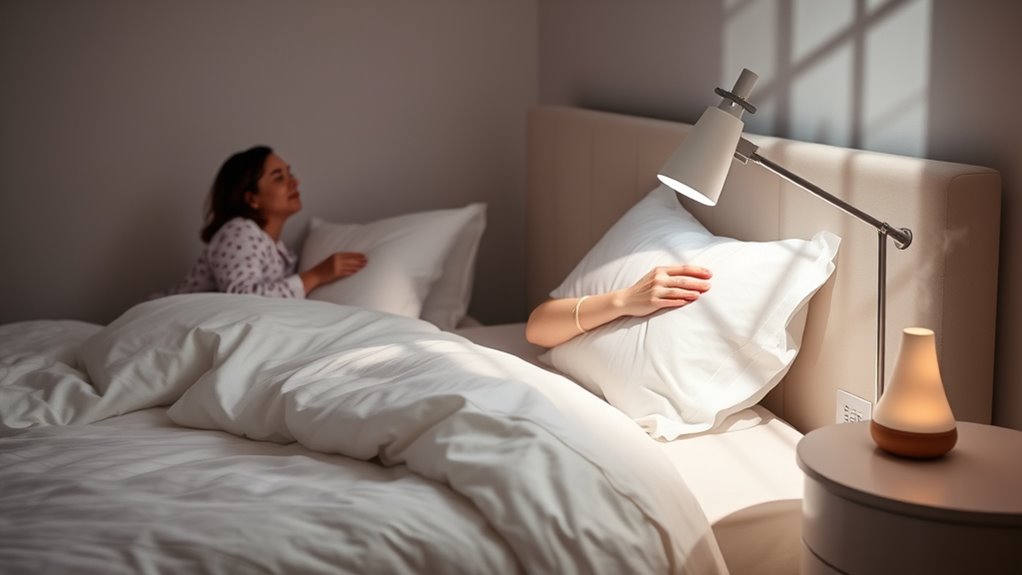
You can improve your sleep by making your bedroom the ideal environment. Keep the room cool, dark, and quiet to support restful sleep. Also, limit distractions like screens and noise that can disrupt your sleep quality. Ensuring proper air quality can further enhance sleep comfort and overall well-being.
Optimal Room Conditions
Creating a restful sleep environment starts with optimizing your room conditions to promote relaxation and comfort. Keep your bedroom humidity levels between 40-60% to prevent dryness or excess moisture, which can disrupt sleep. Use a humidifier or dehumidifier as needed to maintain this balance. Noise control is equally important; eliminate or reduce loud sounds and consider using earplugs or white noise machines to drown out disturbances. Make sure your room is dark by using blackout curtains or an eye mask, and keep the temperature cool—around 65°F (18°C)—to support deep sleep. By managing humidity and controlling noise, you create a calm, inviting space that signals your body it’s time to rest, helping you fall asleep faster and stay asleep longer. Additionally, selecting portable camping fans can help maintain a comfortable temperature and improve airflow in your sleeping area.
Minimize Distractions
Since distractions can easily interfere with falling asleep, reducing them in your sleep environment is essential. Noise interference and electronic distractions are common culprits that disrupt your rest. To create a restful sleep space, consider these tips:
- Keep electronic devices out of the bedroom or turn them off an hour before bed
- Use blackout curtains to block external noise and light
- Invest in a white noise machine or earplugs to mask noise interference
- Avoid screens at least 30 minutes before sleep to reduce blue light exposure
- Establish a calming bedtime routine to signal your body it’s time to rest
- Be mindful of audio equipment placement, ensuring that headphones or speakers do not cause additional noise disturbances.
Incorporating Relaxation Techniques Before Bedtime

To wind down effectively, try practicing deep breathing exercises or mindfulness meditation each night. These techniques help calm your mind and relax your body, making it easier to fall asleep. Incorporating them into your routine can substantially improve your sleep quality over time. Additionally, engaging in relaxation techniques regularly can foster emotional and spiritual growth, further enhancing your overall well-being.
Deep Breathing Exercises
Deep breathing exercises can be a simple yet effective way to relax your mind and body before bed. By focusing on your breath, you activate your relaxation response, helping to reduce stress and calm racing thoughts. Incorporate breathing techniques like inhaling deeply through your nose, holding for a few seconds, and exhaling slowly through your mouth. To deepen your practice, consider:
- Paying attention to each breath to stay present
- Using controlled, slow inhales and exhales
- Pacing your breathing to match a calming rhythm
- Visualizing stress leaving your body with each exhale
- Practicing consistently to build relaxation habits
- Remembering that mindfulness techniques can enhance your overall sense of calm and well-being
These techniques can help you unwind, ease tension, and set the stage for restorative sleep. Regular practice enhances your ability to manage stress, making bedtime a peaceful transition.
Mindfulness Meditation Practice
Practicing mindfulness meditation before bed can markedly enhance your ability to relax and shift into restful sleep. By focusing on your breath and staying present, you reduce stress and quiet a busy mind. This form of mindfulness meditation encourages you to observe your thoughts without judgment, helping to release worries accumulated during the day. Incorporating a few minutes of meditation into your nightly routine can substantially improve stress reduction, making it easier to unwind. Find a comfortable position, close your eyes, and breathe deeply, paying attention to each inhale and exhale. Over time, this practice trains your mind to settle more quickly, promoting deeper sleep and easing the progression from wakefulness to rest. Consistent mindfulness meditation creates a calming bedtime ritual that benefits your overall sleep quality. Engaging with community tools and sharing experiences can further reinforce your relaxation habits and support sustained practice.
Managing Stress and Emotional Well-being
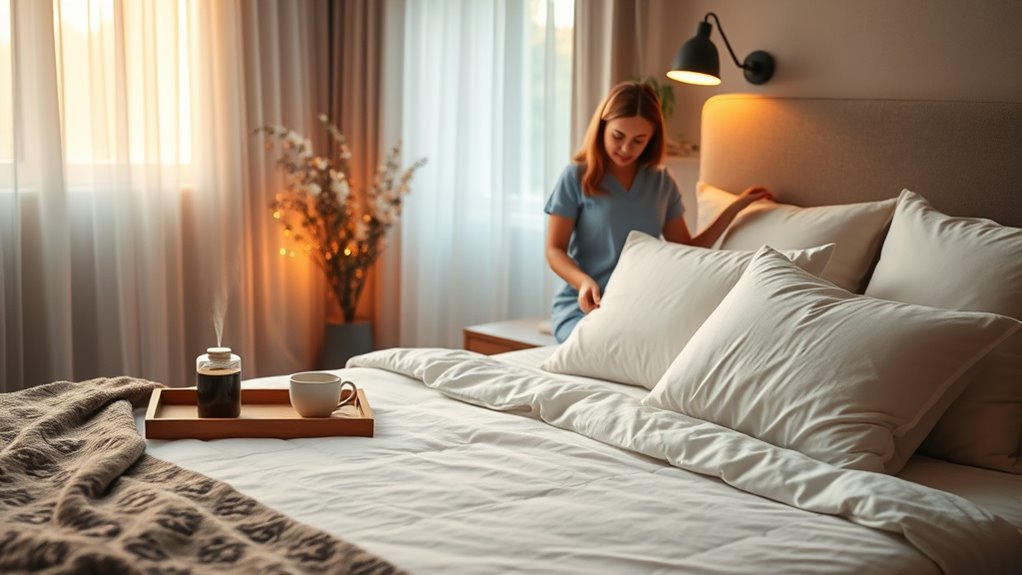
Managing stress and emotional well-being is essential for caregivers to maintain their health and provide quality care. When you prioritize stress management and build emotional resilience, you can better handle daily challenges and maintain a sense of balance. To support this, consider these strategies:
- Practice deep breathing exercises during busy moments
- Schedule regular breaks to recharge mentally
- Connect with friends or support groups for emotional strength
- Set realistic expectations to reduce feelings of overwhelm
- Engage in hobbies to foster positive emotions
- Utilize AI security tools to monitor and manage your digital well-being, reducing anxiety related to online threats.
Focusing on these actions helps you stay centered and resilient. When your emotional well-being is strong, you’re less likely to experience burnout and more capable of offering compassionate, attentive care. Remember, caring for yourself is crucial for sustainable caregiving.
Limiting Screen Time and Blue Light Exposure

After prioritizing your emotional well-being, it’s important to also pay attention to how screen time affects your sleep and overall health. Excessive screen time, especially before bed, exposes you to blue light, which can interfere with melatonin production. This disruption makes it harder to fall asleep and reduces sleep quality. To improve your sleep routine, try setting a cutoff time for screens at least an hour before bedtime. Use features like night mode or blue light filters on your devices if you need to use screens later in the evening. Reducing blue light exposure helps signal to your body that it’s time to wind down. Additionally, understanding the importance of lifestyle for longevity can motivate you to establish healthier evening habits. By limiting screen time and managing blue light exposure, you support better sleep and overall well-being.
Monitoring Dietary Habits and Caffeine Intake

What you eat and drink throughout the day can considerably impact your sleep quality. Monitoring your dietary habits and caffeine consumption helps guarantee restful nights. Be mindful of caffeine intake, especially in the afternoon and evening, as it can stay in your system and disrupt sleep. Also, pay attention to meal timing; eating heavy or spicy meals close to bedtime can cause discomfort and hinder falling asleep. To optimize your routine:
- Limit caffeine after mid-afternoon
- Avoid large, heavy meals before bed
- Incorporate calming, sleep-promoting foods
- Maintain consistent meal times daily
- Stay hydrated without overloading before bed
- Understanding the importance of home theatre projectors can help create a relaxing environment conducive to better sleep.
Prioritizing Physical Activity During the Day
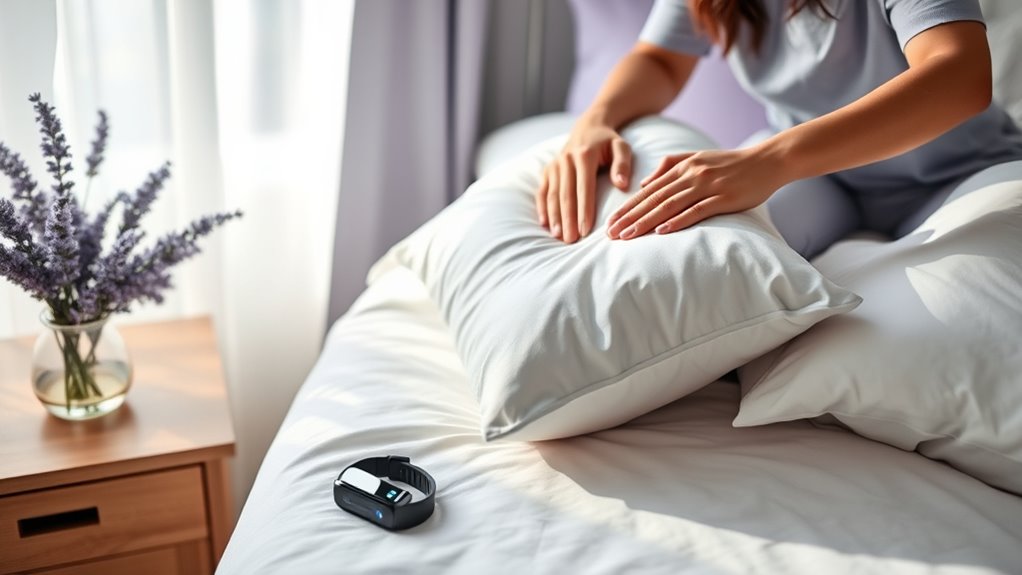
Incorporating regular physical activity into your daily routine can substantially improve your sleep quality. Staying active boosts your energy levels and helps regulate your body’s internal clock, making it easier to fall asleep at night. To keep exercise motivation high, try integrating outdoor activities like brisk walking, cycling, or gardening into your day. These activities expose you to natural light, which supports your circadian rhythm and enhances sleep. Prioritize movement during the day, especially in the afternoon, to prevent restlessness at bedtime. Remember, even short sessions of activity can make a difference. Consistency is key, so find outdoor activities you enjoy and make them a regular part of your routine. This proactive approach helps you feel more alert during the day and promotes restful sleep at night.
Utilizing Sleep Aids and Natural Remedies Safely
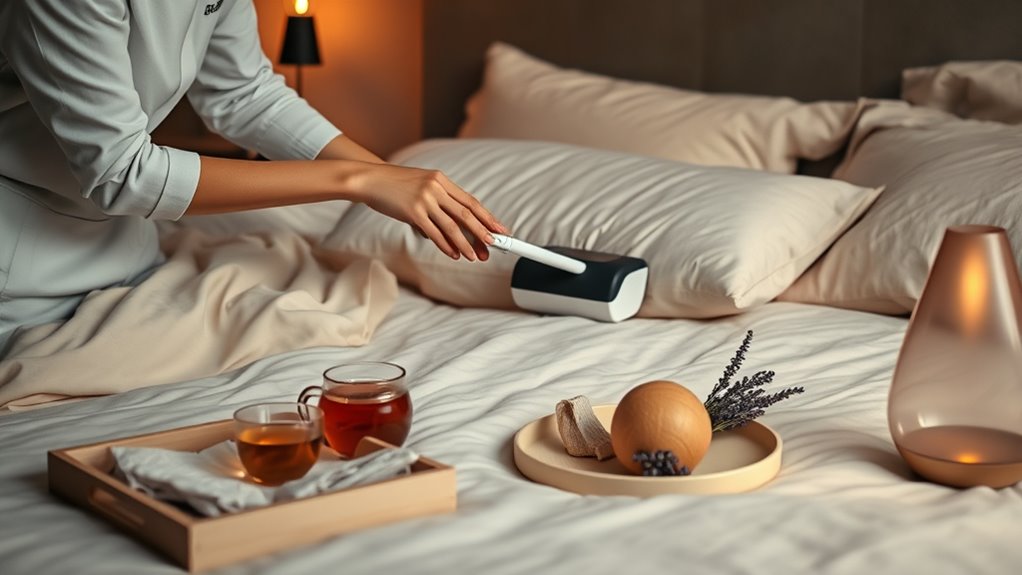
Building on your efforts to stay active during the day, using sleep aids and natural remedies can further support restful nights. When considering herbal supplements and aromatherapy options, it’s essential to utilize them safely and responsibly. Always consult with a healthcare professional before starting any new supplement, especially if you’re on medication or have existing health conditions. Choose high-quality products from reputable sources to avoid contaminants. Be mindful of dosage and avoid overuse, which can lead to adverse effects. Aromatherapy options like lavender or chamomile essential oils can promote relaxation, but ensure proper dilution and ventilation. Remember, natural remedies should complement good sleep habits, not replace them.
Enhance restful sleep safely with quality supplements, proper use, and complementary relaxation routines.
- Prioritize quality and safety
- Follow recommended dosages
- Use reputable brands
- Combine with relaxing routines
- Monitor your body’s response
Recognizing and Addressing Sleep Disruptions

Recognizing sleep disruptions early allows you to address issues before they become persistent problems. Pay attention to sleep pattern irregularities, such as inconsistent bedtimes or difficulty falling asleep. Nighttime awakenings are common but can signal underlying issues if they happen frequently. If you notice you’re waking up multiple times or struggling to return to sleep, it’s time to evaluate potential causes. Keep a sleep diary to track your patterns and identify triggers like stress, caffeine, or medication effects. Addressing these disruptions promptly helps restore restful sleep and prevents them from worsening. Simple adjustments, like establishing a calming bedtime routine or reducing screen time before bed, can make a significant difference in maintaining healthy sleep habits.
Frequently Asked Questions
How Can Caregivers Balance Sleep Needs With Their Caregiving Responsibilities?
You can balance your sleep needs with caregiving by prioritizing caregiver self-care and optimizing your sleep environment. Set a consistent bedtime, create a dark, quiet space, and limit screen time before bed. Schedule short breaks to recharge and delegate tasks when possible. Remember, taking care of yourself improves your ability to care for others, so make sleep and self-care non-negotiable parts of your routine.
What Are Signs of Sleep Deprivation Specific to Caregivers?
Imagine your body as a delicate clock, and sleep deprivation throws off its rhythm. You might notice caregiver fatigue, like running on empty, and emotional exhaustion that drains your spirit. You may struggle to focus, feel irritable, or have trouble remembering details. These signs show your body’s warning signals, urging you to prioritize rest. Recognizing them early helps you restore balance and protect your well-being amid caregiving demands.
How Do Sleep Routines Vary for Different Age Groups of Care Recipients?
Your sleep routines should adapt based on the age of your care recipients. For infants, focus on age-specific routines like soothing activities and consistent bedtime cues, while older adults may benefit from maintaining regular sleep schedules and respecting cultural sleep practices. Adjusting routines to meet these needs helps guarantee everyone gets quality rest. Incorporate flexibility for individual preferences and cultural traditions to create a supportive, restful environment for your loved ones.
Can Sleep Tracking Devices Improve Sleep Quality for Caregivers?
Sleep tracking devices, especially wearable technology, can markedly improve your sleep quality by providing detailed insights into your sleep patterns. By monitoring your sleep stages, interruptions, and overall restfulness, you can identify issues and make informed adjustments to your routine. Using this data, you can optimize your sleep environment and habits, ensuring you’re better rested and more prepared to care for others effectively.
What Should Caregivers Do if Sleep Problems Persist Despite Routine Adjustments?
If sleep problems persist despite routine adjustments, you should seek professional consultation to identify underlying issues. Incorporate stress management techniques like meditation or deep breathing to help relax your mind and body. Prioritize discussing your sleep concerns with a healthcare provider, who can recommend further assessments or treatments. Don’t ignore ongoing sleep difficulties, as addressing them early can improve your health and caregiving effectiveness.
Conclusion
By sticking to these simple routines, you’ll create a solid foundation for restful sleep—like building a sturdy bridge over the chaos of caregiving. Remember, caring for others includes caring for yourself. Prioritize your sleep as you would your loved ones, and watch how it transforms your energy and well-being. With consistency and patience, peaceful nights will become your new normal, helping you face each day refreshed and ready to give your best.









